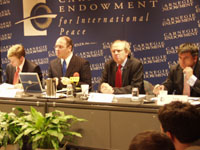Registration
You will receive an email confirming your registration.
IMGXYZ434IMGZYXOn November 22, 2005, the Carnegie Endowment for International Peace hosted a meeting entitled “One Year After the Orange Revolution: An Assessment.” The speakers were Anders Aslund, Director of the Carnegie Russian and Eurasian Program, Adrian Karatnycky, Senior Scholar at Freedom House, Professor Taras Kuzio, of George Washington University, and Michael McFaul, Senior Associate at the Carnegie Endowment. A summary of the discussion follows below.
The panelists praised the Orange Revolution effusively, calling it “a revolution in political consciousness” and lauding the vibrant civil society it spawned. While all agreed the new government has made mistakes, the panel expressed optimism about next year’s parliamentary elections and the future of Ukraine.
Adrian Karatnycky invoked the aggressiveness of the Ukrainian media and the frequency of small protests in Kiev as evidence of the new energy in Ukraine. Taras Kuzio mentioned the continued decline of the communists in the last election and added that while the orange coalition has experienced confusion, the Kuchma camp has been in total disarray. Michael McFaul saw even the confusion as evidence of democracy in action. In this connection he cited Tymoshenko’s firing and the resignation of officials accused of corruption.
While many Ukrainians are disappointed in Viktor Yushchenko’s presidency thus far, all four panelists called this a normal case of post-revolutionary letdown. According to Karatnycky, polls show that the decline in the government’s rating occurred between May and August, largely due to poor economic performance. This was before Yushchenko sacked then-Prime Minister Yulia Tymoshenko. Since then, said Karatnycky, the ratings of major political actors have returned to their established levels.
The panelists placed the blame for the new government’s mistakes in different quarters. Anders Aslund condemned Tymoshenko’s “wild interventions” in commodity prices and applauded her firing. Kuzio said both Yushchenko and Tymoshenko deserve both credit and blame. He condemned the joint declaration issued by Yanukovich and Yushchenko, saying it severely damaged the president in Kiev. Had Yushchenko not spent so much time abroad, Kuzio claimed, he could have had his new prime minister confirmed without embarking on such a damaging compromise.
Defending Tymoshenko’s record, Kuzio cited the transparent auction process for Krivoryzhstal [a large state metallurgical works] as one of her successes. He argued that the government’s policy incoherence was largely the fault of the “second government” headed by then-Secretary of the National Security and Defense Council [and chocolate kingpin] Petro Poroshenko. McFaul concurred with Kuzio that the blame should not fall solely on Tymoshenko. McFaul said revolutions often deal severe blows to GDP—after the revolutions of 1917 and 1991 Russian GDP fell by 50 percent. Viewed in this light, Ukraine’s 2004 economic slowdown looks quite mild.
The panelists agreed unanimously that talk of reprivatization had been a huge mistake. Aslund pointed out that GDP, investment, and machine building and metals production (these were the industries most often threatened with reprivatization) fell steeply through August. Meanwhile there was no decline in light industry and consumption actually increased due to greater public spending.
The other major economic change over the past year was the sharp increase in tax pressure to approximately six percent of GDP, mostly due to the elimination of loopholes and better collection. While Aslund applauded the more equitable tax enforcement, he called the high tax pressure a problem and said it was driven by excessive pension commitments.
Aslund expressed strong approval of current Prime Minister Yuriy Yekhanurov, calling him “the opposite of Tymoshenko” and “organized and effective.” Yekhanurov’s most significant achievements have been in foreign economic policy. Ukraine needs to conclude only two more bilateral agreements (with the US and Australia) to accede to the WTO. On December 1 the EU will extend market economy status to Ukraine and the US is expected to follow suit in January. Just last week the Senate passed a bill put forward by Sen. Richard Lugar that lifted the Jackson-Vanik amendment from Ukraine. Aslund said FDI in Ukraine had reached eight percent of GDP, well above average for a developing country.
The panel came to some agreement on the major problems left unresolved by the revolution. Karatnycky argued the Orange Revolution didn’t reach deep into institutions and said high officials are frustrated by the parliament, which was elected in an unfree, unfair vote. McFaul pointed to other problems: 1) the possibility of Yanukovich becoming prime minister again; 2) the lack of accountability for the Gongadze murder, the electoral frauds of the past, and the illegal activities of the oligarchs; and 3) the East-West divide and the myths surrounding it. Aslund lamented Ukraine’s continuing lack of a functional judicial system. Ukraine still does not have many basic corporate and finance laws, including a law on joint stock companies. Aslund said one of Ukraine’s biggest economic challenges next year will be Gazprom’s proposed price increase for Russian gas, which could cost Ukraine an additional $1.3 bn.
Next year’s parliamentary elections elicited restrained optimism from the panelists. Karatnycky predicted the pro-orange parties will garner approximately fifty-seven percent of the vote. McFaul was similarly sunny. He predicted a good debate, partly because the election will be under a proportional system. (McFaul noted that presidential elections and “first past the post” systems tend to be more polarizing.) Said McFaul, “We don’t know who will be the next prime minister, and that’s good.” Sounding a more cautious note, Kuzio stressed the unpredictability of the election. He identified three possible coalitions: 1) a new orange coalition with Yushchenko, Tymoshenko, and the socialists; 2) “Kuchma light” with Yanukovich and the party of Rada Speaker Volodymyr Lytvyn; or 3) “Kuchma hard” with Yanukovich, Lytvyn, and the Communists. Kuzio called the first and second variants more likely than the third. Under “Kuchma light,” Yanukovich would become prime minister. Under a new orange coalition, either Yekhanurov or Tymoshenko would be prime minister, depending on how their respective parties poll.
Summary prepared by Matthew Gibson, Junior Fellow with the Russian and Eurasian Program at the Carnegie Endowment for International Peace.
